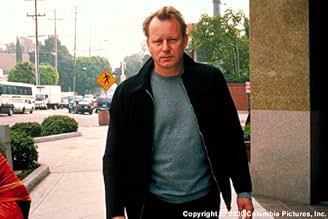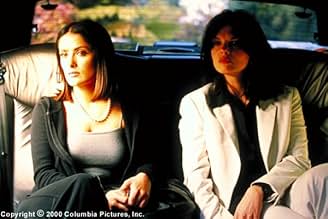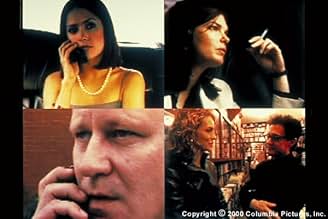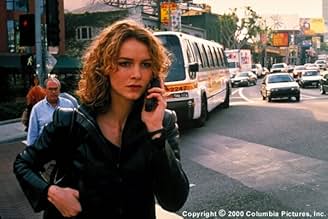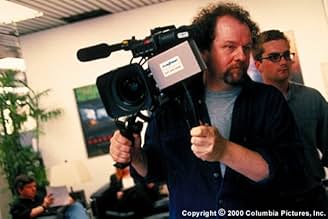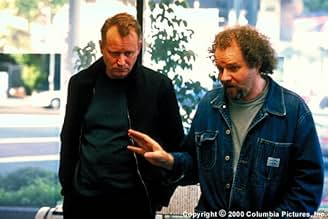NOTE IMDb
6,0/10
7,3 k
MA NOTE
Quatre plans-séquences simultanés suivent tour à tour une amante lesbienne passionnée obsédée par les infidélités de son partenaire, et les activités tendues d'une société de production de f... Tout lireQuatre plans-séquences simultanés suivent tour à tour une amante lesbienne passionnée obsédée par les infidélités de son partenaire, et les activités tendues d'une société de production de films hollywoodiens.Quatre plans-séquences simultanés suivent tour à tour une amante lesbienne passionnée obsédée par les infidélités de son partenaire, et les activités tendues d'une société de production de films hollywoodiens.
- Réalisation
- Scénario
- Casting principal
- Récompenses
- 2 nominations au total
Avis à la une
Mike Figgis does a Robert Altman. Except, instead of creating a large narrative of interconnecting plot strands, he puts them all on four split screens. Is this therefore more subversive than Altman? I don't think so - Altman's method is an attack on Hollywood linearity, on conventional methods of 'connection'; his characters exist is the same space but are emotionally etc. miles apart. The characters in 'Short Cuts', like the city of L.A. itself, are a mass without a centre. Figgis, for all the supposed diffusion of his visual strands, actually reunites, glues together Altman's ruptures. In this way it might seem a more optimistic kind of film. It isn't.
'timecode' is being touted as a revolution in cinema, a new way of watching films. Instead of watching one screen and being led by a director, we are given four, and asked to make our choices. I was surprised at how panicked I was at this in the first 20 minutes, darting between scenes, wondering which one I should follow. This forced me out of the film much more disturbingly than anything by Fassbinder or Godard. But this alienation is deceptive. Firstly we are not really bombarded by four narratives - put 'pierrot le fou', 'diary of a country priest', 'vampyr' and 'branded to kill' on four screens, then you'd be confused. Figgis leads you all the way, gives you an illusion of choice, but rarely fulfils it. The focus is on one screen at a time - either the soundtrack is turned up loudest, the plot is more interesting, whatever. For long periods of time, you can safely ignore other scenes because there is nothing going on - for about 20 minutes, for example, Lauren sits in a limousine listening to a bug planted on Rose; this leaves us free to watch another screen and see what she's listening to. Other scenes are merely tedious - eg Emma droning to her shrink (a nod to Godard's 'week end', that famous end of cinema?) - so that you gladly look elsewhere. It is possible to listen to one scene, and flit around at the others to catch up on what's going on.
What I'm saying is, 'timecode' is not a difficult experience - after the initial adjustment, you watch the film as you would any other, especially as all the stories converge and are really only one story. Even at the beginning, the feeling is less one of Brechtian alienation than akin to being a security guard faced with a grid of screens - you rarely think about the physical processes of film or performance, as you would in a Dogme or Godard film.
So if 'timecode' is less revolutionary than it seems, that doesn't mean it isn't a brilliant film, a real purse in a pig's ear of a year (or whatever the expression is). One reason for this is the four-screen structure: I would have to watch it a few more times, but I was very conscious of the orchestration of the screens, the way compositions, or camera movements, or close-ups etc., in one screen were echoed, reflected, distorted in the others - a true understanding of this miraculous formal apparatus would, I think, give us the heart of the film, and bely the improvised nature of the content. Figgis is also a musician - he co-composed the score - and the movement here, its fugues and variations are truly virtuosic, almost worthy of my earlier Altman comparison.
But the content is great fun too. At first I was disappointed at the self-absorbed drabness of the material, the idea that we shouldn't be made to work too hard because we've enough to deal with the four screens. And, it is true, that the stories rarely transcend cliche. But, such is the enthusiasm of the performers (people like Salma Hayek obviously relishing slightly more useful roles than the bilge they're usually stuck in); the precision of the structure; the mixture of comedy and pathos, and the way the style facilitates both, that you're convinced you're watching a masterpiece. Quentin's massaging and Ana's pitch are two of the funniest things I've seen in ages, while Stellan Skarsgard's rich performance stands out all the more for its brittle surroundings.
'timecode' is being touted as a revolution in cinema, a new way of watching films. Instead of watching one screen and being led by a director, we are given four, and asked to make our choices. I was surprised at how panicked I was at this in the first 20 minutes, darting between scenes, wondering which one I should follow. This forced me out of the film much more disturbingly than anything by Fassbinder or Godard. But this alienation is deceptive. Firstly we are not really bombarded by four narratives - put 'pierrot le fou', 'diary of a country priest', 'vampyr' and 'branded to kill' on four screens, then you'd be confused. Figgis leads you all the way, gives you an illusion of choice, but rarely fulfils it. The focus is on one screen at a time - either the soundtrack is turned up loudest, the plot is more interesting, whatever. For long periods of time, you can safely ignore other scenes because there is nothing going on - for about 20 minutes, for example, Lauren sits in a limousine listening to a bug planted on Rose; this leaves us free to watch another screen and see what she's listening to. Other scenes are merely tedious - eg Emma droning to her shrink (a nod to Godard's 'week end', that famous end of cinema?) - so that you gladly look elsewhere. It is possible to listen to one scene, and flit around at the others to catch up on what's going on.
What I'm saying is, 'timecode' is not a difficult experience - after the initial adjustment, you watch the film as you would any other, especially as all the stories converge and are really only one story. Even at the beginning, the feeling is less one of Brechtian alienation than akin to being a security guard faced with a grid of screens - you rarely think about the physical processes of film or performance, as you would in a Dogme or Godard film.
So if 'timecode' is less revolutionary than it seems, that doesn't mean it isn't a brilliant film, a real purse in a pig's ear of a year (or whatever the expression is). One reason for this is the four-screen structure: I would have to watch it a few more times, but I was very conscious of the orchestration of the screens, the way compositions, or camera movements, or close-ups etc., in one screen were echoed, reflected, distorted in the others - a true understanding of this miraculous formal apparatus would, I think, give us the heart of the film, and bely the improvised nature of the content. Figgis is also a musician - he co-composed the score - and the movement here, its fugues and variations are truly virtuosic, almost worthy of my earlier Altman comparison.
But the content is great fun too. At first I was disappointed at the self-absorbed drabness of the material, the idea that we shouldn't be made to work too hard because we've enough to deal with the four screens. And, it is true, that the stories rarely transcend cliche. But, such is the enthusiasm of the performers (people like Salma Hayek obviously relishing slightly more useful roles than the bilge they're usually stuck in); the precision of the structure; the mixture of comedy and pathos, and the way the style facilitates both, that you're convinced you're watching a masterpiece. Quentin's massaging and Ana's pitch are two of the funniest things I've seen in ages, while Stellan Skarsgard's rich performance stands out all the more for its brittle surroundings.
"Timecode" is not conventional filmmaking, which is the whole beauty of it. This is a totally improvised piece of cinema, shot on a hand-held camera for 90 minutes straight--not a single cut--and shot in real-time. Every word of dialogue is improvised, the only thing written is the story (also by Mike Figgis). The way it turned out is quite impressive. Of course, the process gets tiresome and repetitive at times, but overall it's a pretty fascinating work that will probably be better appreciated by the more open-minded moviegoer--as opposed to mainstream viewers who will probably view this as just plain weird.
I was really impressed by the talented cast filled with great actors who simply went through the WHOLE ENTIRE process without once messing up. If you watch all these behind-the-scenes specials with actors stumbling line-after-line, doing take-after-take, until they finally get it right the 100th time--it's astounding to see that the whole cast was able to pull this off without a scratch. Even with such talented actors like Stellan Sarsgard, Holly Hunter, Salma Hayek, Jeanne Tripplehorn, etc., I have to commend them especially for taking part in this risky project. This movie not only showcases their knacks for acting, but also their potential to try something new, innovative and quite difficult--after all, taking risks is one of the main elements in becoming a good actor.
This type of format does--at points--feel like a theatrical version of a "Big Brother" episode, but Figgis wrote a story with as much intriguing elements as he can possibly fit into a film of this scope. After all, this is supposed a day-in-the-life type of story and you don't want to be too far-fetched. So he tries to generate as much suspense and intrigue (involving the many smutty attributes of the stereotypical white-collar LA resident) as he possibly could. There are subplots involving drug abuse, alcohol abuse, homosexuality, philandering, jealousy and of course the biggest theme of all...Sex! Naturally, my interest did sometimes drift, but the material compelled me enough to be interested for the majority of the running time. I've never been a fan of those corny reality shows. Quite frankly, I think the kind of reality displayed on those programs is very dull. "Timecode" transcends the dullness of the reality shows and, in a way, the "Blair Witch Project" (which is another reality-based film shot entirely on a hand-held camera, but executed very poorly). The material is engaging to a degree, the actors perform it very well and everything is down-to-earth to preserve its sense of realism. My only criticisms lie in the "earthquake effects." Those looked totally cheesy, created entirely by camera tricks and actors pretending to be shaken up. In one of the closing scenes, Jeanne Tripplehorn is clinging on to a nearby bannister while you can see cars in the background moving along smoothly. He could've done without that pretentious trick.
I'm not saying this a great film, but it is one I'll remember for its unique sense of style and I will always remember Mike Figgis for coming up with this innovative method. If you're tired of mainstream cinema and feel anxious to see something new and exciting--this is a film I would recommend.
My score: 7 (out of 10)
I was really impressed by the talented cast filled with great actors who simply went through the WHOLE ENTIRE process without once messing up. If you watch all these behind-the-scenes specials with actors stumbling line-after-line, doing take-after-take, until they finally get it right the 100th time--it's astounding to see that the whole cast was able to pull this off without a scratch. Even with such talented actors like Stellan Sarsgard, Holly Hunter, Salma Hayek, Jeanne Tripplehorn, etc., I have to commend them especially for taking part in this risky project. This movie not only showcases their knacks for acting, but also their potential to try something new, innovative and quite difficult--after all, taking risks is one of the main elements in becoming a good actor.
This type of format does--at points--feel like a theatrical version of a "Big Brother" episode, but Figgis wrote a story with as much intriguing elements as he can possibly fit into a film of this scope. After all, this is supposed a day-in-the-life type of story and you don't want to be too far-fetched. So he tries to generate as much suspense and intrigue (involving the many smutty attributes of the stereotypical white-collar LA resident) as he possibly could. There are subplots involving drug abuse, alcohol abuse, homosexuality, philandering, jealousy and of course the biggest theme of all...Sex! Naturally, my interest did sometimes drift, but the material compelled me enough to be interested for the majority of the running time. I've never been a fan of those corny reality shows. Quite frankly, I think the kind of reality displayed on those programs is very dull. "Timecode" transcends the dullness of the reality shows and, in a way, the "Blair Witch Project" (which is another reality-based film shot entirely on a hand-held camera, but executed very poorly). The material is engaging to a degree, the actors perform it very well and everything is down-to-earth to preserve its sense of realism. My only criticisms lie in the "earthquake effects." Those looked totally cheesy, created entirely by camera tricks and actors pretending to be shaken up. In one of the closing scenes, Jeanne Tripplehorn is clinging on to a nearby bannister while you can see cars in the background moving along smoothly. He could've done without that pretentious trick.
I'm not saying this a great film, but it is one I'll remember for its unique sense of style and I will always remember Mike Figgis for coming up with this innovative method. If you're tired of mainstream cinema and feel anxious to see something new and exciting--this is a film I would recommend.
My score: 7 (out of 10)
You know, some times an 'idea' has never been done before because it should never be done. This movie is a perfect example. Why on earth would anybody think that people want to see a movie split into four quadrants?
I mean, I could take a script as bad as this, and film it upside down. Does that make it good because it is 'daring and original'?
I mean, I could take a script as bad as this, and film it upside down. Does that make it good because it is 'daring and original'?
The purpose of this movie was not to entertain with an extremely dramatic plot full of twists. It was just to show that it is possible to film four separate quadrants and make them work together. THIS film did not even have a real script or anything, and it didn't take much time to complete. In the future, a major production could be created. The only problem is that because the viewer sees everything at once, the film would have to be shorter (Timecode did get boring because it is 90 mins x 4).
There is a rule in science that for an experiment to be meaningful, all the variables must be controlled but one. That rule could be applied to experimental cinema, too; at least it should have been applied to this film.
Time Code combines two experiments, one that has promise, and one that is doomed. The promising experiment involves multiple screens following different parts of the story in "real" time. The doomed experiment involves requiring actors to script and direct themselves.
In addition, this movie was shot in four simultaneous uninterrupted takes. Maybe this was an experiment, too, but it is comparable to live theater, which is not exactly a novelty. It is neither a good thing nor a bad thing -- and should be a matter of complete indifference to the audience, as long it works. Instead of cutting from scene to scene, our attention shifts from screen to screen.
The four-screen experiment did work reasonably well here, especially on DVD, where one can instantly back up to catch bits one missed. The multi-view device might even have been truly excellent in this film, had it not been for the other experiment -- the Absentee Director.
A feature movie is not an improv sketch. There is a reason that an army has one general, and that a movie has one director. Although each of these endeavors requires the effort and cooperation of many talented people, both a military campaign and a feature film must be focused on one person's vision and goals.
Time Code has the same fatal flaw as Dancing at the Blue Iguana. Each actor was instructed to invent his own character, and then to direct himself. In Time Code each performer was evidently told to make of his character a recognizable Hollywood stereotype. The result: eight variations on "coke-snorting pretentious but sycophantic loser," who all walk stiffly through their parts like zombies trying to perform soap opera. I cannot imagine how desperate a viewer would have to be, in order to care about any of them.
I suppose this should not reflect badly on the performers, although it cannot have helped their careers. I have seen most of them in other films, and they are all capable actors. It does reflect dismally on the director. Where was he hiding while the four cameras were running? Maybe he was busy watching four tumble dryers at the laundromat up the street.
Time Code might be worth a peek on dollar-day at the video store -- which is how I found it. Otherwise, forget it. 3/10.
Time Code combines two experiments, one that has promise, and one that is doomed. The promising experiment involves multiple screens following different parts of the story in "real" time. The doomed experiment involves requiring actors to script and direct themselves.
In addition, this movie was shot in four simultaneous uninterrupted takes. Maybe this was an experiment, too, but it is comparable to live theater, which is not exactly a novelty. It is neither a good thing nor a bad thing -- and should be a matter of complete indifference to the audience, as long it works. Instead of cutting from scene to scene, our attention shifts from screen to screen.
The four-screen experiment did work reasonably well here, especially on DVD, where one can instantly back up to catch bits one missed. The multi-view device might even have been truly excellent in this film, had it not been for the other experiment -- the Absentee Director.
A feature movie is not an improv sketch. There is a reason that an army has one general, and that a movie has one director. Although each of these endeavors requires the effort and cooperation of many talented people, both a military campaign and a feature film must be focused on one person's vision and goals.
Time Code has the same fatal flaw as Dancing at the Blue Iguana. Each actor was instructed to invent his own character, and then to direct himself. In Time Code each performer was evidently told to make of his character a recognizable Hollywood stereotype. The result: eight variations on "coke-snorting pretentious but sycophantic loser," who all walk stiffly through their parts like zombies trying to perform soap opera. I cannot imagine how desperate a viewer would have to be, in order to care about any of them.
I suppose this should not reflect badly on the performers, although it cannot have helped their careers. I have seen most of them in other films, and they are all capable actors. It does reflect dismally on the director. Where was he hiding while the four cameras were running? Maybe he was busy watching four tumble dryers at the laundromat up the street.
Time Code might be worth a peek on dollar-day at the video store -- which is how I found it. Otherwise, forget it. 3/10.
Le saviez-vous
- AnecdotesThe actors and actresses were responsible for their own costumes, hair, and make-up.
- GaffesCameraman reflected on an elevator door as he follows Emma after the therapist sequence.
- Versions alternativesThe film was transferred from digital video to film stock for theatrical presentation. The video release, however, uses the original digital video picture format.
- Bandes originalesComfort Of Strangers
Written by Mike Figgis, Anthony Marinelli and Skin
Performed by Skin
Courtesy of Virgin Records Limited
By Arrangement with Red Mullet Ltd.
Meilleurs choix
Connectez-vous pour évaluer et suivre la liste de favoris afin de recevoir des recommandations personnalisées
- How long is Timecode?Alimenté par Alexa
Détails
Box-office
- Budget
- 5 000 000 $US (estimé)
- Montant brut aux États-Unis et au Canada
- 1 057 750 $US
- Week-end de sortie aux États-Unis et au Canada
- 93 148 $US
- 30 avr. 2000
- Montant brut mondial
- 1 431 406 $US
- Durée
- 1h 37min(97 min)
- Couleur
- Mixage
- Rapport de forme
- 1.85 : 1
Contribuer à cette page
Suggérer une modification ou ajouter du contenu manquant


